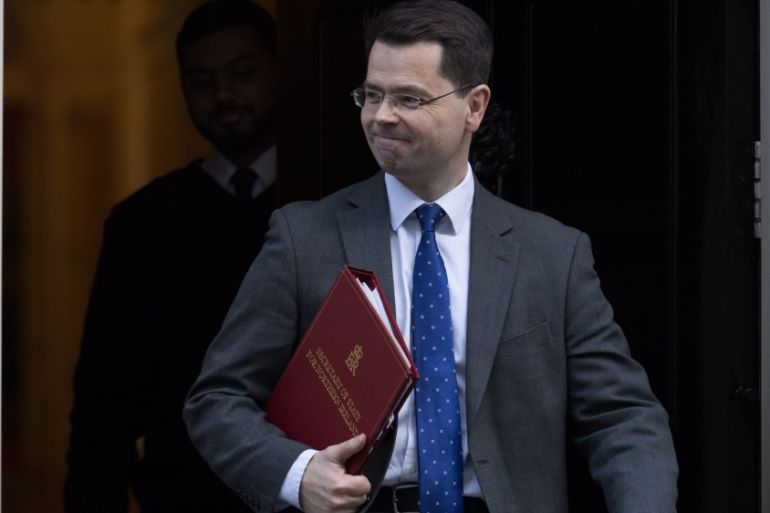London gives N Ireland more time for power-sharing deal
Northern Ireland parties have “short window of opportunity” to avoid suspension of self-rule despite expired deadline.

The British government has given Northern Ireland’s largest political parties extra time to form a power-sharing regional government, after a deadline to resolve their differences expired.
The extension on Monday staved off the risk of a suspension of devolved power for the first time in a decade.
James Brokenshire, Northern Ireland secretary of the United Kingdom, said the failure of the talks was “extremely disappointing”, but he saw a “short window of opportunity” of several weeks for more talks.
|
|
“I think there are a few short weeks in which to resolve matters,” Brokenshire said shortly after the three-week deadline expired at 15:00 GMT. He did not explain on what basis more time would be given.
While the law obliges him to call new elections, which would be the third in 12 months, it also gives him some leeway on when exactly to hold them.
Brokenshire said there was no appetite for a return to direct rule from London, a move which would require the law to be changed, but which some feel could prove unavoidable if repeated elections fail to bring the parties together.
“I believe there is an overwhelming desire among the political parties and the public here for strong and stable devolved government,” he said.
Brokenshire said Belfast civil servants will assume essential government responsibilities this week, but the government limbo cannot continue indefinitely.
Theresa May: Northern Ireland crisis mustn’t jeopardise peace
The crisis is an unwanted distraction for British Prime Minister Theresa May two days before she is due to trigger divorce proceedings to take Britain out of the European Union.
While Scottish First Minister Nicola Sturgeon has become one of the most vocal critics of May’s Brexit strategy, Northern Ireland’s leaders have been relatively muted. Both regions voted to remain in the EU in last year’s referendum.
As the only part of the UK with a land border with the EU, Northern Ireland faces severe disruption to its economy. Any sign of border controls could inflame opinion among Irish nationalists who want a united Ireland.
“We desperately need local political representatives to speak on our behalf if we are to ensure that UK and EU negotiators have a proper understanding of Northern Ireland’s unique circumstance,” the Northern Ireland branch of the Confederation of British Industry said after Brokenshire’s statement.
“There has seldom been a more important time to have a strong well-functioning executive.”
Multiple grievances
The main Irish nationalist party, Sinn Fein, triggered the collapse of the power-sharing executive in January and withdrew again from talks on Sunday citing a number of grievances with the British Protestants of the Democratic Unionist Party (DUP).
|
|
Under Northern Ireland’s power-sharing agreement, Sinn Fein, which would like to merge with Ireland, works with the DUP, which advocates remaining as part of Britain.
Sinn Fein presented a long list of demands as conditions to re-enter government, including funding services for Irish language speakers, gay rights and inquiries into deaths during the decades of sectarian violence.
The DUP balked, suggesting Sinn Fein was asking for too much because it wanted the talks to fail.
“I wonder whether Sinn Fein were serious about reaching agreement at this time,” DUP leader Arlene Foster said.
Sinn Fein leader Gerry Adams posted a video to the party’s website that suggested he was not likely to soften its demands.
“Unionism is in my opinion at a crossroads. Whether it embraces everyone and upholds the rights of everyone … or it doesn’t,” Adams said.
“There can be no equivocation, no conditionality.”